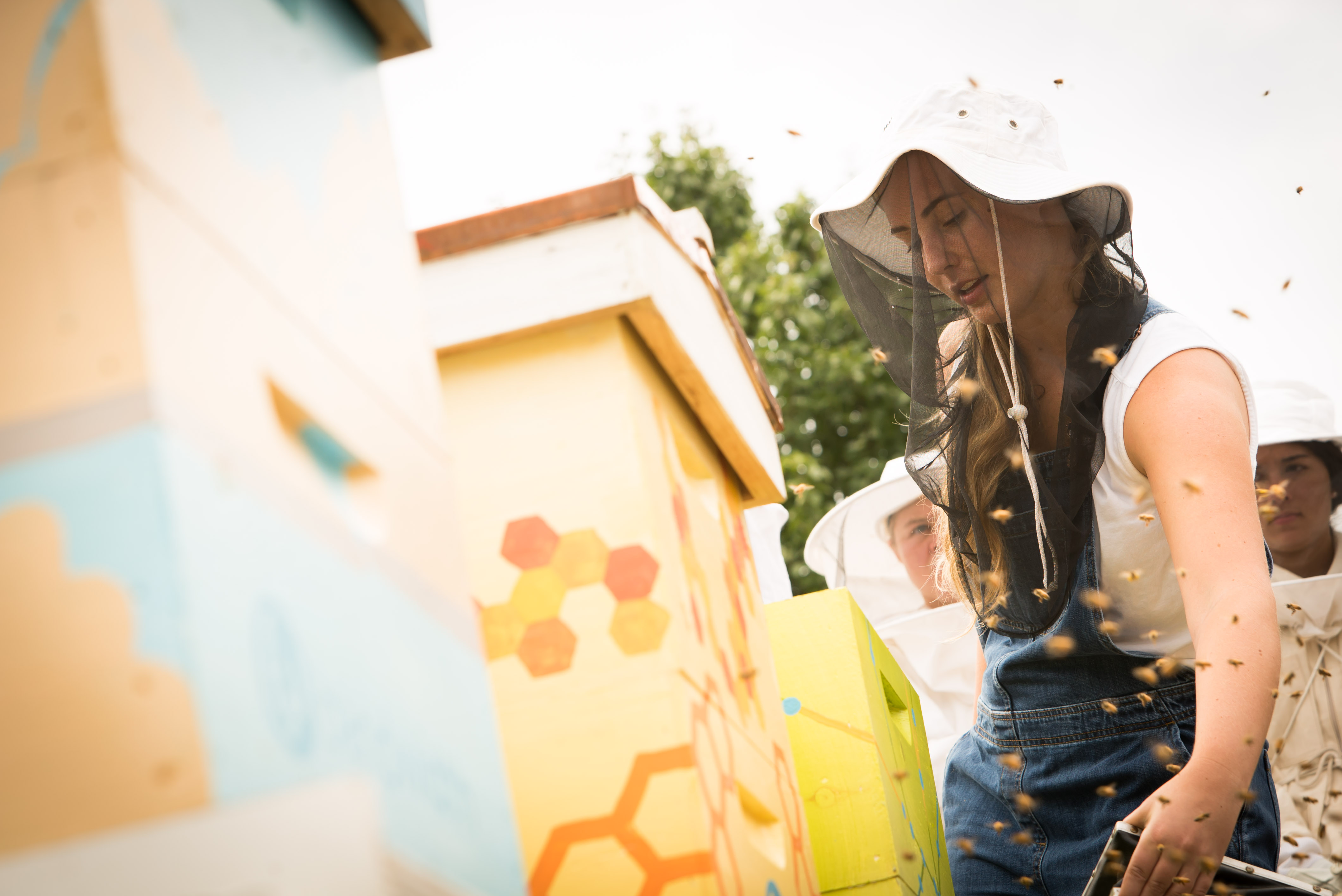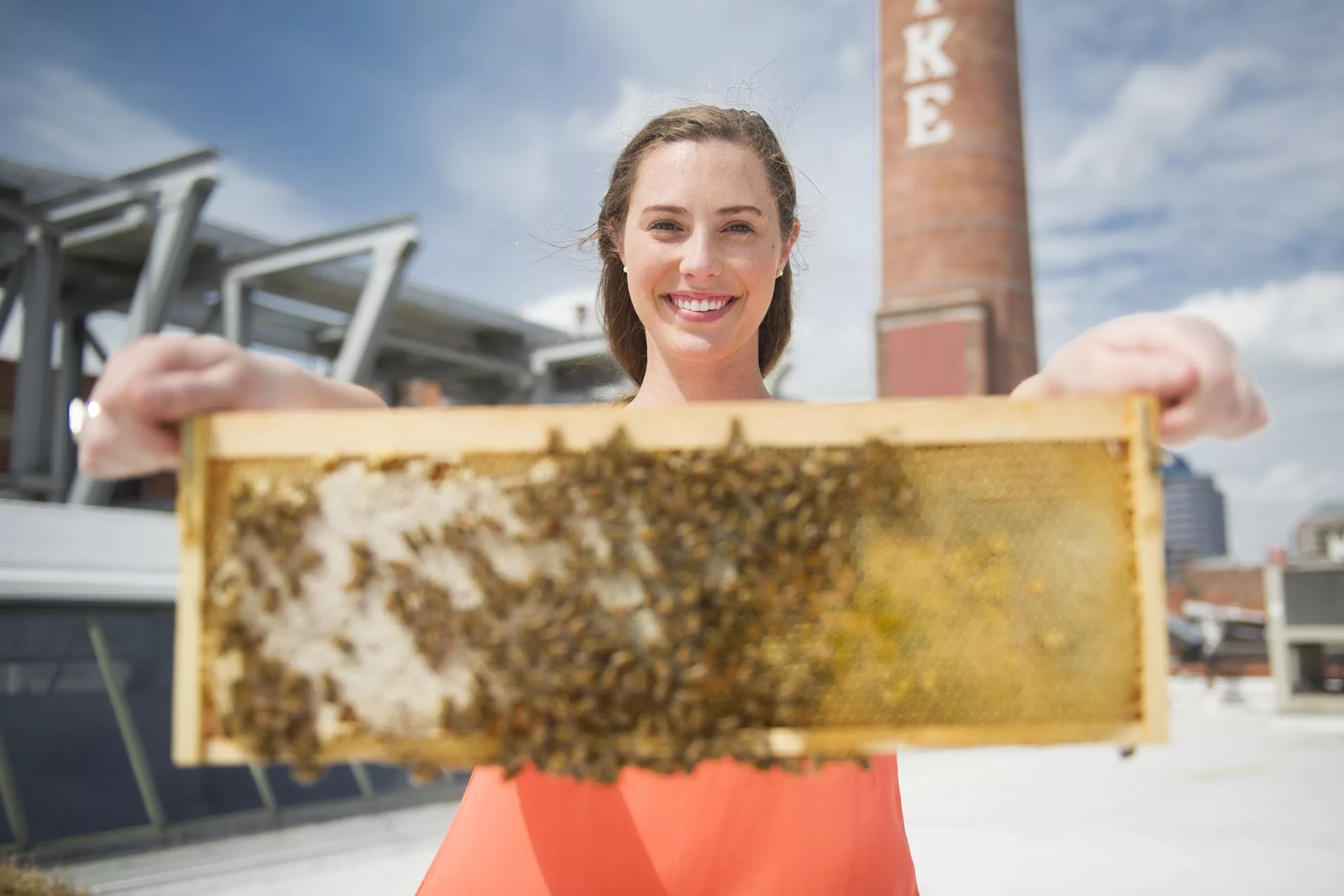As a fourth-generation beekeeper, Bee Downtown Founder Leigh-Kathryn Bonner understands the role pollinators play in guaranteeing the global food supply. But over the last few decades, the world has seen a decline in honey bee health and numbers due to multiple factors, including decreased habitat and the use of harmful chemicals. In 2015, the United States alone lost 44 percent of its beehives, the highest loss reported by the USDA in a decade.
We sat down with Bonner — one of the recipients of the EILEEN FISHER Woman-Owned Business Grant Program — to learn about how she’s building a social enterprise that gives bees a fighting chance by partnering with large corporations that adopt hives, learn about beekeeping, and even transform their workplace cultures and surrounding communities in the process.
Tell us about your journey. How did you get here?
I’m a fourth-generation beekeeper, and I started the company when I was a junior in college at NC State University. It was a passion project. I couldn’t keep beehives at my apartment complex, so the company I was interning with told me that I could put some hives on their roof. They happened to own the campus where Burt’s Bees world headquarters is located, and mentioned they thought that Burt’s might like to have bees on site, so we ended up installing some beehives there. As the media picked up the story, other companies heard about us and it started to snowball. By the time I graduated, I decided it would be worth a try to make this my full-time work, because if I didn’t, I’d always wonder… what if? My parents were my first investors. They set aside a year of living expenses for me. But I had only six months to prove to them that the company was viable, could grow, and would turn a profit. I’m pleased to report that we’re now in our third full year. We’ve been profitable every year and have grown from three beehives to around 200 as of spring 2018.
There’s so much news about the bees. Can you explain what the crisis all boils down to?
LKB: Bees are an indicator species. That is, they give us a lot of information about how nature is doing. Right now, the bees aren’t doing well, and we need to take that very seriously. Every third bite of food you eat is thanks to a honeybee. And 70 of the world’s top 100 food crops are pollinated by bees. They’ve been around for 110 million years, quietly providing us with everything we’ve needed to survive on this planet. They’re speaking up for the first time. They’re trying to tell us something, and we’re not doing a great job of listening. Honeybees (and other bees too) around the world are dying at alarming rates. All the pollinators are.
There’s no one smoking gun. There are a variety of factors: pests, pesticide, parasites, and also our agricultural processes. Nowhere in nature do you find a monoculture crop.

Leigh-Kathryn Bonner with some of the hives Bee Downtown has installed.
How does Bee Downtown build partnerships?
LKB: Bee Downtown is a full-service employee engagement and sustainability initiative that gets placed on a corporate campus. Usually, we install three beehives that are hand-painted by artists. But that’s not all. Our goal is to build a community around the bees. We do all the maintenance on the hives throughout the year, and the corporations get the honey. They even host honey tastings for their employees. There are multiple touch-points throughout the year. For example, the company receives leadership courses, and employees learn from the hive, together. They suit up, tour the beehives with us, and learn about the collaborative mindset of the hive. Then, they can take their knowledge back to work and apply it. We also collect data from the hive. This is great for general research on pollinator health and cities, and the companies can include the data we prepare for them in their annual environmental report.
What’s the immediate impact you see on corporate culture?
LKB: The analogy we use at Bee Downtown is that by herself, one honeybee makes a half-teaspoon of honey in her whole life. But together, a hive generates over 80 pounds of honey in a matter of months. If human beings can learn to collectively work together like a hive in our communities, we can make a change in the world of which we’re all proud. One company getting a beehive makes a difference, but it doesn’t create nearly as big of an impact as all the companies in a city doing this together, and bringing education, funding for agriculture, and the importance of farming back to the forefront of their daily lives. We even bring transparent beehives to local schools to educate local children about the bees, too.
It’s a beautiful partnership between large companies and small social enterprise. The large companies know how to generate a return on investment, and we help them make an additional environmental return on investment. We watch the corporate culture change. Employees start asking questions, like… what are we planting? Why didn’t our bees do well this year? What are our landscapers doing? They’re engaged. They’re excited to take care of the beehives, together. And that tells a much bigger story.
What’s the most valuable lesson bees have taught you about business?
LKB: The beehive is the most collaborative structure that exists. Every bee has a specific job, and there’s complete trust within the hive that the job is going to get done. Bees don’t micro-manage. They don’t double-check their neighbor’s work. They trust that everyone is operating for the good of the hive. It’s remarkable that, due to an individual bee’s short life cycle, they’ll not live to see the end product. And yet, their life’s work makes a difference in the long run for the good of their hive. But the bees aren’t only working in the hive. They’re also pollinating three miles in every direction. To produce one pound of honey, a hive would have to fly over 55,000 miles — that’s twice the circumference of the earth. So the bees are working together, collaboratively, to make an impact, and as a result, they benefit not only themselves, but the surrounding area as well.
It’s easy to apply this hive analogy to startup culture. You can’t skimp on collaboration in a startup. At a startup, you’re trying to build community around something you’re passionate about. At Bee Downtown, we see collaboration as building a hive-like space, in which every person is trusted to do their part and contribute to the whole. And we never forget that a beehive exhibits the highest level of communication you’ll find. If communication breaks down — if the bees start to get sick, or chemicals enter the hive — the whole system crashes. Collaborate, and communicate. Those are two key lessons we can learn from the bees.
Can you share some other tips for social entrepreneurs?
Culture matters. Your first hires are the most important thing you’ll do. If you don’t hire the right person, it can ruin your company. It takes a lot more time to fire someone and start over than it takes to find the right person. If it’s a role with which you’re less experienced, ask for help and bring a board member into the interview process. You’re laying the foundation of what you want your company to be. It can’t have cracks in it if you want to build long-term.
Celebrate wins. I don’t think founders celebrate wins nearly enough, and I’m working on that. We move quickly on to the next piece of the puzzle. But your team has to know that you recognize the wins, and it’s important to celebrate with them. People want to celebrate. They want to be part of something successful. If you blow past your successes to the next thing, then your company feels like they’re never doing enough. Sit in the wins with your team.
You don’t know it all. And if you fake like you do, people will see right through it. If you ask for help, you’ll find out that people really do want to help you. I have a professional board of advisors, but I also have a personal board, too. I can go to them with anything; they’re going to give me honest answers. You need that as an entrepreneur. Sometimes you can feel so alone in your headspace. Things can spin out of control quickly from one day to the next, and you need a strong group of advisors to help keep you on track.
Be sincere. This is a core value of our brand, and you can’t fake it. We’re sincerely grateful for everyone who has helped us along the way. I think my generation can be too quick to skip over thankfulness. We don’t take the time to write a handwritten thank-you note to someone who took time to sit down with us during their day. Strive to remember where you came from, know where you want to go, and be thankful for each step of the way.
How do you keep going when times get tough?
LKB: We wanted to expand to Atlanta in 2019, but we were accepted into an accelerator program and offered an investment to go this year. I’m a risk taker when it comes to Bee Downtown, except when it comes to people’s livelihood. I had two days to decide if we were going to take the investment. At this point, we were a team of two, so I’d be leaving one person with one hundred hives in North Carolina. I couldn’t figure out the path forward. I had 30 minutes left until I had to say yes or no, and I was overwhelmed. I started crying and one of my advisors saw me. She told me I had to go for a walk to clear my head. So I did. I meandered my way through downtown Durham and somehow ended up at Burt’s Bees, right by the first beehive we put it. It’s a clear beehive that stands six feet tall at the front of their world headquarters. People can open it up and see the secret life of bees through the glass. I think I was half-praying, half-begging the bees to give me an answer. I realized I’d asked everyone’s opinion, except theirs. I knew that, as a founder, I had to take the time and sit in whatever I was feeling.
I closed the door and started walking back. That’s when a woman popped around the corner and stopped me. She thought she recognized me, and asked if I was the founder of Bee Downtown. She told me her younger daughter had been following me since the very beginning, and was now studying pollinators at NC State. She told me, “If my daughter grows up to be half the woman you are, I’ll feel like I did a good job.” That was the answer I needed. In that moment, I knew that I had to be OK with taking risks. I told myself that if going to Atlanta means that another little girl or young woman gets to know that she can do something in agriculture because she has seen me do it, then it’s worth it. My leadership philosophy is: have courage and be kind. It can be hard being a female entrepreneur in a male-dominated industry, but a story like this makes it all worth it. You never know how your story might affect someone else’s life. So when things get tough, it’s important to remember that we can each make a big difference in the world.
This article is part of a series featuring the 2017 winners of the EILEEN FISHER Woman-Owned Business Grant Program. Instilling confidence in women business owners is one of Eileen Fisher‘s personal passions, and since 2004 the grant program has supported innovative, women-owned companies that are beyond the start-up phase and ready to expand their business and their potential for positive social and environmental impact.



